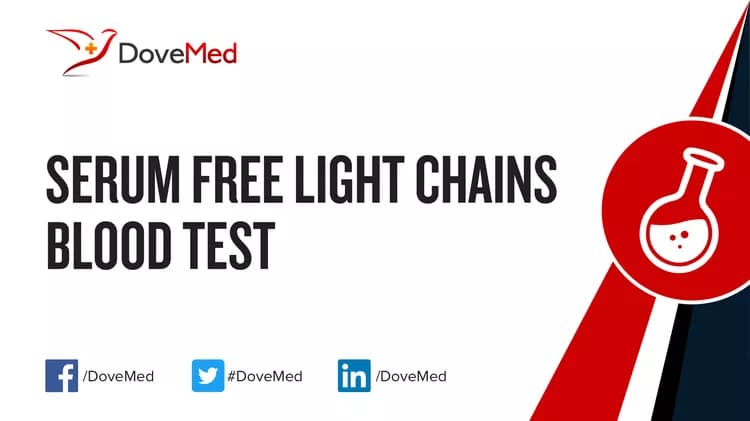What are the other Names for this Test? (Equivalent Terms)
- Free Kappa/Lambda Ratio Test
- Free Light Chains Test
- Quantitative Serum Free Light Chains with Ratio
What is Serum Free Light Chains Blood Test? (Background Information)
- Antibodies (Abs), the body’s circulating defense proteins, are composed of two kinds of proteins. These are named according to their relative molecular weights
- An antibody is shaped like a ‘Y’, split down the middle. The top branch of each half of the ‘Y’ is attached to an opposing “mirror image” piece
- There are 2 heavy chains per antibody. Each comprises the main half of the Y. Heavy chains are on the inside of the antibody
- There are also 2 light chains per antibody. These comprise the “mirror images” that oppose the top branch of each half. Light chains are on the outside of the antibody
- There are 2 kinds of light chains, kappa and lambda. These are normally present within antibodies in a fixed ratio of 3 kappa to 1 lambda
- Antibodies are produced by special white blood cells, called plasma cells. Each plasma cell makes a unique antibody and only that antibody. It can produce as much as 100 million clones of that antibody per hour
- Plasma cells make more light chains than can be used to make antibodies. Thus, having small amounts of light chains circulating freely in blood is normal. When freely circulating, the normal light chain ratio is roughly 2 kappa to 3 lambda
- Plasma cell disorders are called monoclonal gammopathies or dyscrasias. Multiple myeloma is one such disorder
- Disordered plasma cells produce abnormal proteins in large amounts. These may still come together to make abnormal antibodies, called M-proteins
- Or, the abnormal proteins, usually light chains, may be released into the bloodstream. The result is a spike in free light chains in circulation and a skewed kappa to lambda ratio. Free proteins, such as light chains, may aggregate to form disease-causing clumps, called amyloids. These disorders are called amyloidoses
- The Serum Free Light Chains Blood Test is a test that determines the quantity of free light chains in blood. It also measures the relative numbers of the subtypes, kappa and lambda. This test is useful in diagnosing monoclonal gammopathies
What are the Clinical Indications for performing the Serum Free Light Chains Blood Test?
Following are the clinical indications for performing a Serum Free Light Chains Blood Test:
- Follow-up to a serum and urine protein electrophoresis test
- Bone pain
- Confusion, dizziness
- Susceptibility to infections
- Irregular heartbeat (arrhythmia)
- Swelling (edema)
- Monitor therapy for a monoclonal gammopathy
How is the Specimen Collected for Serum Free Light Chains Blood Test?
Following is the specimen collection process for Serum Free Light Chains Blood Test:
Sample required: Blood
Process: Insertion of a needle into an arm vein.
Preparation required: No special preparation is needed prior to the test.
What is the Significance of the Serum Free Light Chains Blood Test Result?
The following is the significance of the Serum Free Light Chains Blood Test:
- Elevated light chain proteins with a skewed kappa to lambda ratio may indicate:
- Monoclonal gammopathy of undetermined significance (MGUS)
- Multiple myeloma
- Light-chain (AL) amyloidosis
- Primary myelofibrosis
- Elevated light chain proteins with a normal kappa to lambda ratio may indicate a kidney disorder
- Decreased light chain proteins may indicate a bone marrow disorder
The laboratory test results are NOT to be interpreted as results of a "stand-alone" test. The test results have to be interpreted after correlating with suitable clinical findings and additional supplemental tests/information. Your healthcare providers will explain the meaning of your tests results, based on the overall clinical scenario.
Additional and Relevant Useful Information:
- Certain factors interfere with the Serum Free Light Chains Blood Test. One of these is the presence of a kidney disorder, if this is not the reason for performing the test
- This test is often performed alongside an immunofixation electrophoresis test
Certain medications that you may be currently taking may influence the outcome of the test. Hence, it is important to inform your healthcare provider, the complete list of medications (including any herbal supplements) you are currently taking. This will help the healthcare provider interpret your test results more accurately and avoid unnecessary chances of a misdiagnosis.
Related Articles
Test Your Knowledge
Asked by users
Related Centers
Related Specialties
Related Physicians
Related Procedures
Related Resources
Join DoveHubs
and connect with fellow professionals


0 Comments
Please log in to post a comment.